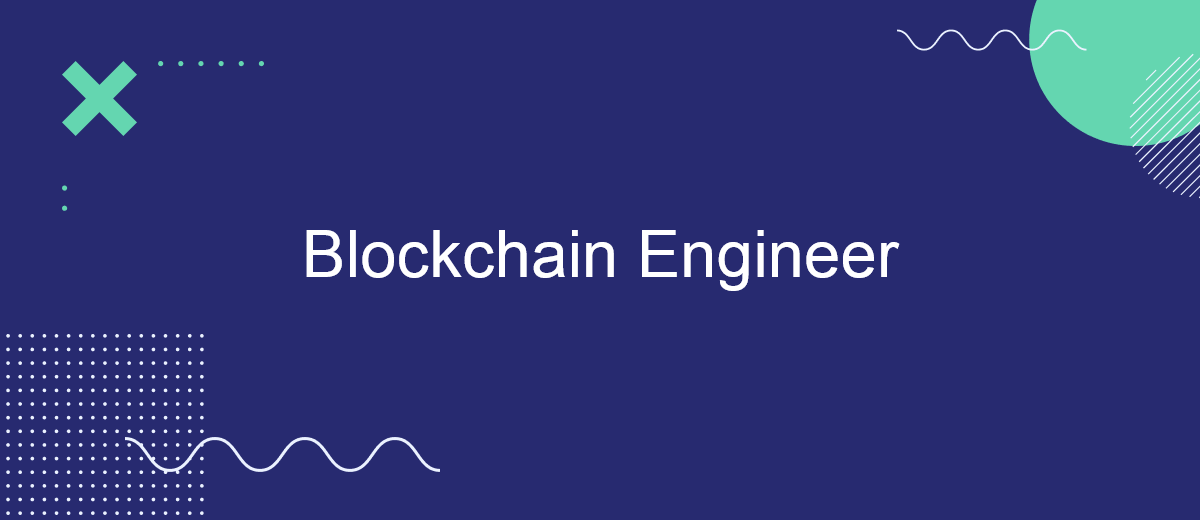Blockchain is not just a trend of recent years, but a real revolution in the field of technology. Its implementation changes the established approaches to data management, providing transparency, decentralization, and security in various industries: from finance to healthcare. Behind this progress are professionals – engineers who not only develop and maintain blockchain systems but also create new opportunities for business and society.
Today, the profession of a blockchain engineer is one of the most sought-after in IT. It promises broad prospects for career growth and a high level of income. In this article, we will examine in detail what a blockchain engineer is, what skills are needed for success in this profession, and how it opens doors to new opportunities in a decentralized world.
Understanding Blockchain Technology
Blockchain technology is an innovative way of storing and transmitting data that provides security, transparency, and decentralization. It works as a digital ledger, storing information in sequential blocks. Each block contains transaction data and is linked to the previous one using a cryptographic hash, a unique code created based on the data in the block. This connection between blocks makes the blockchain resistant to changes: if someone tries to change the data in one block, the hash will change, and the network will immediately recognize the forgery.
Copies of the blockchain are stored on multiple nodes (computers). This makes the system decentralized. Each network participant has access to the full version of the registry. Any changes must be confirmed by the majority of participants through a consensus mechanism. This eliminates the need for central governing bodies and increases trust in the system.
Information added to the blockchain cannot be deleted or changed. Instead, new entries are made. This preserves the integrity of the entire history of data. However, in some cases, changes are possible through mechanisms such as forks if they are supported by the network of participants.

Blockchain is an ideal technology for creating reliable and secure systems, as data is protected from unauthorized changes and is accessible to all network participants. It minimizes the risks of fraud and errors, providing a high degree of trust in areas such as cryptocurrencies, financial transactions, and supply chain management.
Roles and Responsibilities of a Blockchain Engineer
Effective blockchain operation is impossible without blockchain engineers – specialists who design, develop, and support blockchain networks and decentralized applications (dApps). They create reliable and secure solutions that ensure process automation and increased transparency in various industries: finance, logistics, asset management, and more.
What does a blockchain engineer do? Their main responsibilities include:
- Designing blockchain network architecture. Engineers create new platforms or integrate blockchain into existing business processes.
- Smart contract development. These are programs that are automatically executed based on the conditions written in the program code. The conditions are verified by the blockchain network that supports smart contracts (Ethereum, Binance Smart Chain, Solana). This allows for the automation of transactions and increased transaction security.
- Testing and debugging systems. Blockchain engineers test developed solutions, identify and eliminate errors, maintaining their stable operation.
- Ensuring the security of blockchain networks. Engineers implement cryptographic methods (hash functions, digital signatures) to protect data and verify its authenticity. This helps prevent unauthorized access and maintain the confidentiality of transactions.
- Network performance monitoring. Specialists monitor network operation, optimize, and scale systems as the load increases.
- Researching new technologies. Blockchain engineers monitor new developments in blockchain and cryptocurrency, incorporating them into existing solutions to improve efficiency and security.
- Interaction with other specialists. During their work, engineers collaborate with software developers, system architects, cybersecurity specialists, and business analysts. Such contacts are necessary for the high-quality integration of blockchain technologies into the company's overall IT infrastructure.
Blockchain engineers create decentralized systems that can revolutionize industries from cryptocurrency to supply chain management. They are directly responsible for the security, resilience, and functionality of such systems, implementing advanced approaches to automation and data protection. Successfully solving such complex problems requires not only deep technical knowledge but also a range of hard and soft skills.


Essential Skills for Blockchain Engineers
Successful work as a blockchain engineer requires a combination of hard and soft skills. This combination allows specialists to effectively develop and implement innovative solutions that meet business needs.
Hard skills:
- Knowledge of blockchain architecture. Understanding the basic principles of blockchain networks (data structure, nodes, consensus mechanisms) is the foundation for design and development.
- Experience in programming. Knowledge of programming languages (Solidity, Rust, Java, C++, Python) is a must for a blockchain engineer. These languages are used to create smart contracts, develop blockchain applications, and process data.
- Understanding cryptography. Blockchain engineers must understand cryptographic concepts, including hash functions, digital signatures, and encryption methods. This is necessary to ensure the security and privacy of data in decentralized systems.
- Experience with databases and networks. Understanding distributed systems and network infrastructure helps engineers effectively manage data and ensure its availability.
- Testing and debugging skills. Blockchain engineers must be able to test developed systems and smart contracts, identify and fix errors to ensure their stability and security.
Soft skills:
- Analytical skills. Specialists need to be able to evaluate various technologies and methods, analyze their advantages and disadvantages in order to find optimal solutions for specific tasks.
- Troubleshooting. Blockchain engineers often face complex challenges, so being able to come up with creative solutions is one of the most important skills.
- Communication and collaboration. Interacting with other team members, clients, and stakeholders requires strong communication skills to effectively convey ideas and find common ground.
- Flexibility and adaptability. Blockchain technologies are developing very quickly. The ability to adapt to changes and master new tools and methods is an important quality for a specialist who strives to achieve success.
The combination of these blockchain engineer skills allows one to work effectively in a constantly changing environment and cope with the challenges that arise in the process of developing decentralized systems. These skills not only increase competitiveness in the labor market but also provide an opportunity to make a significant contribution to the development of technologies, shaping the future of various industries.
Career Path and Opportunities
With the growing popularity of blockchain technologies, there is a surge in demand for blockchain engineers. These specialists are becoming key in projects related to decentralized systems and play an important role in the transformation of entire sectors of the economy.
Blockchain engineers work in the following areas:
- Blockchain core development. Specialists in this field develop and update protocols for existing and new networks. They ensure the reliability and security of blockchain systems by working with the main components of the architecture.
- Blockchain application development. A blockchain software engineer focuses on creating dApps, smart contracts, tokens, and other blockchain-based solutions. In addition, they design user interfaces and perform integration with other systems.
Every year, more and more blockchain engineer jobs are opening up in various fields. As of today, the following fields hold the status of the main ones:
- Financial services. Blockchain technologies are being actively implemented in the banking sector to optimize processes, improve transaction security, and reduce costs. Specialists help create new payment systems and asset management solutions.
- Healthcare. This industry uses blockchain to ensure patient data security and improve healthcare information management. Engineers are developing decentralized applications to exchange data between healthcare facilities and patients.
- Supply chain management. Blockchain technologies guarantee transparency and efficiency in supply chain management, allowing tracking of goods from the manufacturer to the consumer. Engineers create solutions to automate processes and improve monitoring.
- Crypto industry. Due to the growing popularity of cryptocurrencies, companies operating in this area are actively looking for qualified specialists. Blockchain engineers are developing new products and platforms that contribute to the expansion of the cryptocurrency market.
Blockchain engineer salaries testify to the high demand for such specialists in the labor market. Their income level usually depends on experience, specialization, industry, and geographic location. In many ways, the size of this indicator is determined by geolocation. For example, in Seattle and San Francisco, they receive $170,000 – 175,000 per year, and the average blockchain engineer salary in the US is $107,000. In London, they can count on £147,000, and on average in the UK – only £92,000. In Germany, they can earn an average of €50,000 per year, in India – ₹614,000, in China – CN 385,000.
Overall, blockchain engineer careers offer promising prospects, interesting projects, and opportunities for professional growth. With the dynamic development of technology, specialists in this field can expect a career boost that will contribute to their success in the future.
How to Become a Blockchain Engineer
Becoming a blockchain engineer requires a combination of education, practical experience, and skills, as well as an understanding of how to be a blockchain engineer. To begin with, future specialists are recommended to obtain an education in computer science, programming, or related disciplines. This will provide the necessary foundation in algorithms, data structures, and software development principles.
It is advisable to receive a comprehensive education:
- Universities and colleges. Many educational institutions offer programs in blockchain-related specialties. It is important to choose those areas that cover blockchain theory, cryptography, and smart contract development.
- Online courses. A number of platforms (Coursera, Udacity, edX) offer specialized courses on blockchain technologies. They are often developed in collaboration with universities and professional companies. This is a good way to deepen your knowledge.
It is a huge mistake to think that after completing a course called “How to become a blockchain engineer” you can immediately become a high-class specialist. In addition to theoretical knowledge, practical experience is also important. It is recommended to participate in open-source projects, create your own dApps or smart contracts to build up a portfolio. Participation in hackathons and blockchain competitions can also be useful for gaining practical experience and establishing contacts in the industry.
Blockchain technologies are developing very quickly, so constant learning and monitoring new trends and developments is a key aspect of success in this field. Reading specialized blogs, participating in webinars, and monitoring new publications will help you stay up to date with the latest changes.
Future Trends in Blockchain Technology

Blockchain technology continues to evolve and change the landscape of many industries. Even more significant changes are expected in the future. Research shows that the implementation of blockchain technologies can bring huge benefits to businesses. According to forecasts by the American research company Gartner, the added value from their use will reach $360 billion by 2026, and by 2030 this figure may grow to $3.1 trillion.
Let's look at some key trends that will shape the future of blockchain technologies:
- Network interoperability. As technology continues to be introduced into various areas of life, the ability to integrate new and existing blockchain networks will become critical. This will enable the creation of interconnected ecosystems that allow for the seamless exchange of data and resources across platforms.
- Decentralized finance (DeFi). It is an alternative to traditional financial systems that provides users with access to financial services without having to trust intermediaries. Today, DeFi technologies are exploring new areas, such as insurance protocols. The number of DeFi projects, users, and investments in this area is expected to grow, making it an important part of the financial landscape.
- Internet of Things (IoT) and blockchain. The integration of blockchain technologies with IoT opens up new opportunities for creating secure and decentralized solutions. One of them is systems for managing “smart” cities, where devices can interact with each other using blockchain for security and transparency of data exchange. The implementation of such a solution can be seen in Copenhagen (the capital of Denmark). Blockchain also allows for the guarantee of the authenticity of data coming from IoT devices, which is critical in such applications.
- Asset tokenization. This is the process of converting physical and intangible assets into digital tokens that can be easily transferred and exchanged. The trend is gaining popularity in many sectors, including real estate, art, and startup funding. Tokenization makes assets more accessible to investors by simplifying the process of buying and selling them. It also facilitates the creation of new business and financing models.
The trends observed in the blockchain industry highlight that this technology continues to have a significant impact on various aspects of our lives. Blockchain not only provides new tools for businesses but also opens the door to innovative solutions in a variety of industries. With rapid technological advancement, blockchain professionals will be at the center of change. This will create many new opportunities for their careers and professional growth.
Conclusion
The development of blockchain technology has led to the emergence of a new, highly sought-after profession: blockchain engineer. These specialists play a key role in creating decentralized systems that can transform various fields of activity, from finance and medicine to supply chain management. With interest in blockchain technologies rapidly growing, qualified engineers can expect serious career opportunities and competitive salaries, which average $107,000 per year in the United States.
Success in this field requires a broad range of skills. Blockchain engineers must be well-versed in programming languages, cryptography, and distributed systems' architecture, as well as have strong analytical and communication skills. These qualities will help them effectively handle complex tasks in the process of developing and implementing blockchain solutions, providing opportunities for professional growth.
Also read on our blog:
- Comprehensive Review: Exploring the AI Capabilities of Databricks
- Perplexity AI: The AI-Powered Search Engine Revolutionizing Information Access
- Moveworks: Revolutionizing Workplace Productivity with Generative AI
- Mastering Cohere: A Guide to Advanced AI Language Models
- Understanding Kaggle: A Beginner's Guide to the Data Science Platform
